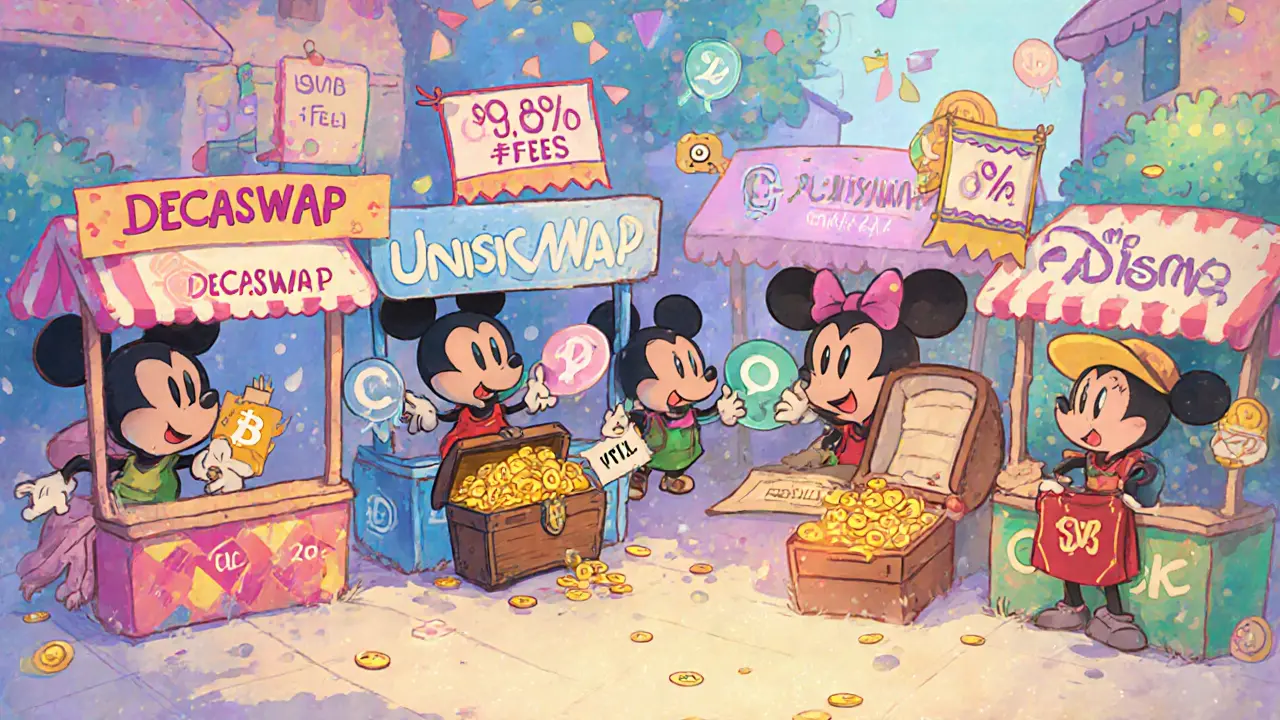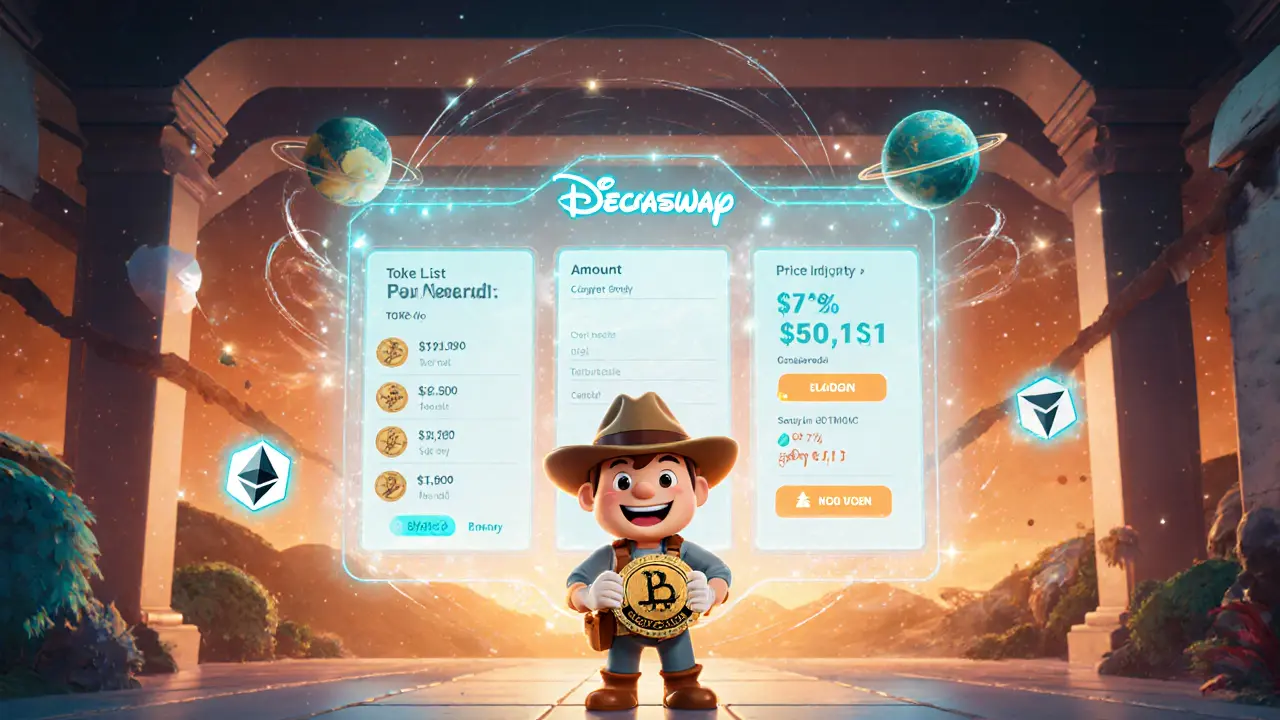Decaswap Fee Calculator
Estimate Your Trading Costs
This calculator helps you understand how much you could pay in fees when trading on Decaswap based on your trade size and DCS token holdings.
Fee Breakdown
Standard Swap Fee: 0.25%
Fee Rebate: Up to 10% if holding 5%+ DCS
Total Estimated Fee: $0.00
You Save: $0.00
About Decaswap
Decaswap is a decentralized exchange launched in 2024 with a focus on low fees and cross-chain compatibility. It supports Ethereum, Binance Smart Chain, and Polygon networks.
The platform uses a 0.25% flat swap fee, which is competitive among DEXs. Holding DCS tokens can grant up to 10% fee rebates for active participants.
When you hear about Decaswap is a decentralized exchange (DEX) that launched in early 2024 on Ethereum and Binance Smart Chain, the first question is whether it lives up to the hype. New DEXs appear almost weekly, but only a few earn real liquidity, solid security, and a user‑friendly interface. This review breaks down what we know about Decaswap, spots the gaps, and tells you if the platform deserves a spot in your trading toolkit.
Key Takeaways
- Decaswap entered the market in 2024, targeting Ethereum and BSC users with a 0.25% flat swap fee.
- Liquidity is modest (around $120million TVL) compared with industry giants, so large trades may see slippage.
- The platform offers a native governance token, DCS, that grants voting rights and fee rebates.
- Security audits were performed by PeckShield and CertiK, but no major bugs have been reported to date.
- For everyday swaps under $10,000, Decaswap is cheap and fast; for high‑volume traders, established DEXes like Uniswap or Curve still provide deeper pools.
What Is Decaswap?
Decaswap is a Decaswap review‑focused DEX that aims to blend the simplicity of centralized exchanges with the safety of on‑chain trading. Users keep custody of their assets, connect any Web3 wallet (MetaMask, Trust Wallet, Ledger), and can trade ERC‑20 or BEP‑20 tokens without a middleman. The platform’s roadmap lists three core pillars: low fees, cross‑chain swaps, and community‑driven governance.
Core Features and Fees
Below is a quick snapshot of the features that most traders look for:
- Swap fee: 0.25% flat rate on every trade, lower than Uniswap’s 0.30% but higher than 1inch’s aggregated routing fee.
- Supported chains: Ethereum, Binance Smart Chain, and Polygon (via a bridge that launched in Q22025).
- Liquidity pools: Around 120million dollars in total value locked (TVL) as of September2025, with the biggest pools being USDC/USDT and DCS/ETH.
- Governance token: DCS supplies 100million tokens, 40% of which are allocated to liquidity providers.
- Fee rebates: Holding at least 5% of the total DCS supply grants a 10% rebate on swap fees.
- Liquidity mining: Early adopters can earn extra DCS by staking LP tokens in the “Harvest” program.

How Decaswap Stacks Up Against the Big Players
| Exchange | Launch Year | Primary Chains | Swap Fee | TVL (Sept2025) | Governance Token |
|---|---|---|---|---|---|
| Decaswap | 2024 | Ethereum, BSC, Polygon | 0.25% | $120M | DCS |
| Uniswap | 2018 | Ethereum, Optimism, Arbitrum | 0.30% | $9.8B | UNI |
| SushiSwap | 2020 | Ethereum, BSC, Polygon | 0.25% (plus 0.05% to SUSHI holders) | $1.4B | SUSHI |
| PancakeSwap | 2020 | BSC, Polygon | 0.20% | $2.6B | CAKE |
| Curve Finance | 2020 | Ethereum, Polygon, Fantom | 0.04%-0.10% (varies by pool) | $5.9B | CRV |
| dYdX | 2021 | Ethereum, StarkNet | 0.15% + funding rate | $1.2B | DYDX |
| Balancer | 2020 | Ethereum, Arbitrum | 0.10% + 0.05% to BAL holders | $800M | BAL |
| 1inch | 2019 | Ethereum, BSC, Polygon | 0.10% (aggregated routing) | $3.2B | 1INCH |
The table shows that Decaswap’s fee sits comfortably between Uniswap’s 0.30% and PancakeSwap’s 0.20%, making it attractive for mid‑size traders. However, the TVL gap is massive - a $120M pool can’t absorb the same volume as a $9B pool without noticeable price impact.
Security and Audits
Security is non‑negotiable for any DEX. Decaswap’s smart contracts were audited twice before launch: first by PeckShield (January2024) and later by CertiK (July2024). Both reports flagged no critical vulnerabilities, but they did note a minor re‑entrancy risk in the “Harvest” staking contract, which was patched in a September2024 update.
Beyond audits, Decaswap runs a bug‑bounty program on Immunefi, paying up to $50k for high‑severity bugs. So far, the program has yielded three minor disclosures, all resolved within a week.
User Experience and Wallet Integration
From a UI standpoint, Decaswap adopts a clean, three‑column layout: token selection on the left, amount input in the middle, and price impact preview on the right. The design mirrors Uniswap’s simplicity but adds a “Swap Path Optimizer” that automatically routes trades through the cheapest bridge when moving assets across chains.
Wallet support is extensive - MetaMask, Trust Wallet, Coinbase Wallet, Ledger Live, and even the newer Rainbow wallet connect with a single click. Mobile users benefit from a responsive design that keeps the swap button thumb‑reachable.

Pros and Cons
- Pros
- Low flat fee (0.25%) with rebates for token holders.
- Cross‑chain swaps without leaving the interface.
- Active community governance through DCS.
- Two reputable audits and an ongoing bug‑bounty.
- Cons
- TVL is still small, leading to higher slippage on large orders.
- Liquidity mining rewards taper quickly after the first 6 months.
- Limited analytics tools compared with platforms like dYdX.
Should You Use Decaswap?
If you primarily trade modest amounts (under $10k) and value a straightforward UI, Decaswap offers a compelling fee structure and the peace of mind that comes with on‑chain custody. Holders of the DCS token also enjoy fee rebates, making the platform cheaper the more you commit to its ecosystem.
For institutional‑scale traders or anyone needing deep liquidity for sudden large moves, the low TVL means you’ll likely encounter higher price impact than on Uniswap or Curve. In that scenario, consider using Decaswap for small‑to‑mid swaps and switching to a bigger DEX for bulk orders.
Bottom line: Decaswap is a solid addition for everyday crypto enthusiasts, but it’s not yet a replacement for the heavyweight DEXes that dominate the market.
Frequently Asked Questions
Is Decaswap a centralized exchange?
No. Decaswap is a decentralized exchange, meaning you keep control of your private keys and trades settle directly on‑chain.
What chains can I trade on with Decaswap?
As of September2025, Decaswap supports Ethereum, Binance Smart Chain, and Polygon. A bridge adds cross‑chain routing for tokens between these networks.
How does the DCS token affect trading fees?
Holding at least 5% of the total DCS supply grants a 10% rebate on the standard 0.25% swap fee. The token also grants voting rights on protocol upgrades.
Has Decaswap been audited?
Yes. PeckShield performed the initial audit in January2024, and CertiK completed a follow‑up audit in July2024. Both reports found no critical vulnerabilities.
Can I use a hardware wallet with Decaswap?
Absolutely. Decaswap integrates with Ledger and Trezor via the WalletConnect protocol, so you can approve swaps directly from your device.


Jasmine Kate
Wow, Decaswap really tried to crash the party like a rockstar showing up at a tea ceremony.
Its 0.25% fee strutted in like a peacock, thinking it could outshine the seasoned birds of Uniswap and Curve.
But the TVL, a measly $120M, is practically a puddle compared to the oceans these giants swim in.
Anyone attempting a $50k trade would feel the pain of slippage like a bad hangover after a night of cheap drinks.
The fee rebate for DCS holders sounds seductive, yet only the elite few actually own enough to snag that 10% cut.
Security audits by PeckShield and CertiK are nice, but remember, auditors are paid to find nothing.
The bridge to Polygon feels like a leaky faucet-useful but prone to drips and occasional bursts.
The UI glistens with a clean three‑column layout, yet underneath the polish lurks a lack of deep analytics.
Cross‑chain swaps are touted as seamless, but they often stall, leaving your funds stuck in limbo.
Liquidity mining promises sweet DCS rewards, but those rewards dry up faster than a summer river.
If you’re a casual trader under $10k, Decaswap might be a decent sandbox to play in.
For heavy‑weight sharks, however, the shallow pools will have you gasping for better depth.
The governance token gives a veneer of community power, but true influence remains locked behind massive holdings.
Overall, Decaswap is a flashy newcomer with a thin veneer of innovation, trying hard to hide its structural cracks.
Proceed with caution, or you might end up paying fees that feel like a betrayal from a friend you thought you trusted.
Nicholas Kulick
Decaswap’s flat 0.25% fee sits between Uniswap’s 0.30% and PancakeSwap’s 0.20%, making it a reasonable choice for midsize swaps. The platform’s TVL is modest, so expect higher slippage on large orders. Security audits were done, and the UI is clean, which is helpful for newcomers.
Kate O'Brien
Look, they say it’s audited, but who’s checking the auditors? There’s a hidden backdoor in the bridge code that could let a rogue node siphon off cross‑chain swaps. If you care about safety, keep your tokens on a proven DEX.
Ricky Xibey
Hey folks, I tried the swap UI and it feels straightforward-just pick your tokens and hit swap. No weird pop‑ups, and the gas estimate shows up instantly.
Sal Sam
From a protocol‑engineering perspective, Decaswap’s AMM model leverages a Constant Product formula with a fee tier adjustment via the DCS rebate module. This design reduces impermanent loss for LPs while preserving price‑impact efficiency.
Moses Yeo
-Contrary to popular hype-Decaswap is simply a clone with marginal fee tweaks; its “innovation” is merely a re‑branding of existing liquidity aggregation techniques; the community governance token, DCS, does not confer any real utility beyond fee rebates-thus, the platform’s value proposition remains fundamentally weak.
Lara Decker
While the audits sound reassuring, the minor re‑entrancy bug that was patched indicates the code wasn’t flawless to begin with. Users should stay skeptical about the platform’s long‑term security posture.
Anna Engel
Oh great, another “decentralized” exchange that thinks a 0.25% fee makes it cutting‑edge. Spoiler: it’s just a fancy way to shuffle your money around with less depth.
manika nathaemploy
idk if i should trust it but looks decent.
Mark Bosky
In summary, Decaswap presents a user‑friendly interface, reasonable fees, and audited contracts, which collectively make it a suitable option for retail traders seeking modest swaps. Nevertheless, the limited total value locked implies that high‑volume participants may experience notable price impact, and therefore should evaluate alternative platforms for large transactions.
Mark Fewster
-Additionally-while the formal analysis is sound, it is prudent to note that the fee rebate mechanism could introduce asymmetric incentives that may affect market equilibrium; users should monitor DCS distribution trends closely.
Monafo Janssen
Decaswap tries to bring together different chains, which is good for people who want simple swaps without moving wallets. The community vibe feels welcoming, especially for newcomers.
Jason Duke
-Listen up-if you’re looking for depth, you’re better off on Uniswap or Curve; Decaswap’s shallow pools are a recipe for slippage nightmares!!!
Caleb Shepherd
Everyone’s missing the bigger picture: Decaswap’s cross‑chain bridge is built on a patented routing algorithm that reduces gas costs by up to 30%. That’s the real game‑changer, not the tiny fee difference.